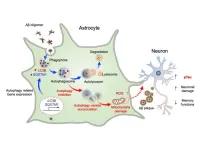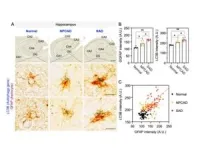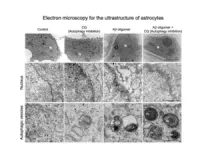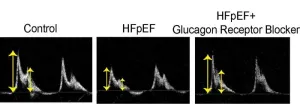(Press-News.org) A research team led by Dr. Hoon Ryu from the Korea Institute of Science and Technology (KIST, President Sang-Rok Oh) Brain Disease Research Group, in collaboration with Director Justin C. Lee of the Institute for Basic Science (IBS, President Do-Young Noh) and Professor Junghee Lee from Boston University Chobanian & Avedisian School of Medicine, has uncovered a new mechanism involving astrocytes for treating Alzheimer’s disease (AD) and proposed a novel therapeutic target. In this study, the researchers revealed that autophagy pathway in astrocytes (non-neuronal cells in the brain) removes amyloid-beta (Aβ) oligomers, the toxic proteins found in the brains of AD patients, and recovers memory and cognitive functions.
AD, a representative form of senile dementia, occurs when toxic proteins like Aβ, abnormally aggregate and accumulate in the brain, leading to inflammation and damage to neurons, causing the neurodegenerative disorders. Although the scientific community has long focused on the role of astrocytes in removing toxic proteins around neurons, the exact mechanism remains unclear.
Autophagy is a process by which cells break down and recycle their own components to maintain homeostasis. The research team scrutinized the autophagy process in astrocytes and discovered that when toxic protein buildup or inflammation occurs in the brains of AD patients, astrocytes respond by inducing genes that regulate autophagy. By delivering these autophagy-associated genes specifically into astrocytes in AD mouse models, the researchers observed the recovery of damaged neurons.
This study demonstrated that astrocytic autophagy reduces Aβ aggregates (protein clumps) and improves memory and cognitive functions. Notably, when autophagy-associated genes were expressed in astrocytes of the hippocampus, a brain region responsible for memory, the neuropathological symptoms were decreased. Most significantly, this study showed that the autophagy plasticity of astrocytes is involved in eliminating Aβ oligomers, a major cause of AD pathology, thus presenting a new potential therapeutic avenue for treating AD.
This research is particularly meaningful as it shifts away from the traditional neuron-centered approach in AD drug development, instead identifying astrocytes (non-neuronal cells) as a novel target for therapy. The research team plans to further explore drug developments that can enhance the autophagic function of astrocytes to prevent or alleviate dementia symptoms, and to conduct preclinical studies in the near future.
Dr. Ryu and Dr. Suhyun Kim (the first author) commented, “Our findings show that astrocytic autophagy restores neuronal damage and cognitive functions in the dementia brain. We hope this study will advance our understanding of cellular mechanisms related to autophagy and contribute to future research on waste removal by astrocytes and health maintenance of the brain.”
###
KIST was established in 1966 as the first government-funded research institute in Korea. KIST now strives to solve national and social challenges and secure growth engines through leading and innovative research. For more information, please visit KIST’s website at https://eng.kist.re.kr/
This research was supported by the Ministry of Science and ICT (Minister Sang Im Yoo), under KIST's Major Projects and the Mid-career Researcher Support Program (2022R1A2C3013138), and the Ministry of Health and Welfare (Minister Gyu-Hong Cho), under the Dementia Overcoming Program (RS-2023-KH137130). These findings were published in the latest issue of the international journal Molecular Neurodegeneration (IF 14.9, JCR 2.1%).
END
New brain cell cleaner: astrocytes raise possibility of Alzheimer’s disease treatment
Autophagy plasticity in astrocytes enhances the removal of dementia-causing substances and the potential for brain function recovery. Astrocytes, non-neuronal cells, are a new target for Alzheimer's disease (AD) treatment
2024-09-30
ELSE PRESS RELEASES FROM THIS DATE:
American Academy of Pediatrics announces its first clinical practice guideline for opioid prescriptions
2024-09-30
Media contacts:
Lisa Robinson, lrobinson@aap.org
Alex Hulvalchick, ahulvalchick@aap.org
American Academy of Pediatrics Announces its First Clinical Practice Guideline for Opioid Prescriptions
Pediatricians should prescribe opioids for pain when necessary, with recommended precautions in place to increase safety, according to a clinical practice guideline released during the AAP 2024 National Conference & Exhibition
ORLANDO, Fla.--The American Academy of Pediatrics has published its first clinical ...
Drivers of electric vehicles are more likely to be at fault in road traffic crashes than drivers of petrol and diesel cars
2024-09-30
Drivers of electric vehicles (EVs) are more likely to be involved in at-fault road traffic accidents than drivers of petrol and diesel cars, research by Lero, the Research Ireland Centre for Software, at University of Limerick and Universitat de Barcelona, reveals.
In the analysis of insurance claims and data from onboard sensors, due to be published in the November issue of the journal Accident Analysis & Prevention, the Lero researchers reveal a number of key findings:
Electric and hybrid drivers exhibit different behaviours ...
Duke-NUS study proposes new heart failure treatment targeting abnormal hormone activity
2024-09-30
Duke-NUS scientists and their collaborators have discovered a potential new treatment for heart failure with preserved ejection fraction (HFpEF), a type of heart disease that is notoriously difficult to treat. The team discovered that the diseased heart cells had high levels of glucagon activity, a pancreatic hormone that raises blood sugar (glucose) levels. Armed with this novel insight, the scientists demonstrated that a drug that blocks the hormone’s activity, can significantly improve heart ...
People who experience side effects from cranial radiation therapy may recover full neurocognitive function within months
2024-09-29
WASHINGTON, September 29, 2024 — A substantial number of patients with brain metastases who experience cognitive side effects following radiation therapy may fully regain cognitive function, according to a pooled analysis of three large, phase III clinical trials. Recovery was more likely for people treated with conformal, or highly targeted, radiation techniques, compared to standard whole-brain treatment. The findings will be presented today at the American Society for Radiation Oncology (ASTRO) ...
Radiopharmaceutical therapy offers promise for people with tough-to-treat meningioma brain tumors
2024-09-29
WASHINGTON, September 29, 2024 — A radiopharmaceutical therapy that has successfully extended progression-free survival for patients with neuroendocrine tumors shows early promise for delivering similar benefits to patients with difficult-to-treat meningioma, a type of brain tumor. Findings of the nonrandomized phase II study will be presented today at the American Society for Radiation Oncology (ASTRO) Annual Meeting.
“We’ve found a therapy with a meaningful signal for effectiveness and safety for people with refractory meningioma, a condition with no ...
American Academy of Pediatrics promotes shared reading starting in infancy as a positive parenting practice with lifelong benefits
2024-09-29
ORLANDO, Fla.--The American Academy of Pediatrics encourages parents and caregivers to read aloud with their newborns and young children as an opportunity to foster loving, nurturing relationships during a critical time of brain development, and recommends that pediatricians support families with guidance and books at well-child visits, according to an updated policy statement.
The policy statement, “Literacy Promotion: An Essential Component of Primary Care Pediatric Practice,” marks the first update in AAP recommendations since 2014. Given the extraordinary amount of research in this area, an accompanying ...
Unexpected human behaviour revealed in prisoner's dilemma study: Choosing cooperation even after defection
2024-09-28
The study also examined the impact of different game structures, such as simultaneous versus alternating decision-making, and the option of voluntary participation. The results showed that these variations significantly influence participants' cooperation rate.
The research reveals that people tend to cooperate even after being defected, which contradicts many traditional game theory models. "This finding is particularly fascinating because it suggests that humans are more forgiving and cooperative than previously thought," said Dr. Hitoshi Yamamoto, the study's lead researcher.
The ...
Distant relatedness in biobanks harnessed to identify undiagnosed genetic disease
2024-09-27
An innovative analysis of shared segments within the genome — an indication of distant “relatedness” — has identified undiagnosed cases of Long QT syndrome, a rare disorder that can lead to abnormal heart rhythms, fainting and sudden cardiac death.
The findings, reported in the journal Nature Communications, illustrate the feasibility of the new approach developed by researchers at Vanderbilt University Medical Center to detect undiagnosed carriers of rare ...
UCLA at ASTRO: Predicting response to chemoradiotherapy in rectal cancer, 2-year outcomes of MRI-guided radiotherapy for prostate cancer, impact of symptom self-reporting during chemoradiation and mor
2024-09-27
UCLA Health Jonsson Comprehensive Cancer Center researchers and physicians who specialize in treating patients with radiation therapies will present data on the latest radiation oncology research and clinical trial results at the 66th annual American Society for Radiation Oncology (ASTRO) meeting in Washington D.C., Sept. 29 to Oct. 2.
The annual meeting, which is the leading meeting in radiation oncology, will feature 23 abstracts from UCLA investigators that highlight key areas of radiation oncology, including new research in subspecialties ranging from survivorship, lung cancer/thoracic malignancies, physics, sarcoma, gastrointestinal cancer, genitourinary cancer, gynecological ...
Estimated long-term benefits of finerenone in heart failure
2024-09-27
About The Study: In this prespecified secondary analysis of the FINEARTS-HF randomized clinical trial, long-term treatment with the nonsteroidal mineralocorticoid receptor antagonist finerenone was estimated to extend event-free survival by up to 3 years among people with heart failure with mildly reduced or preserved ejection fraction.
Corresponding Author: To contact the corresponding author, Scott D. Solomon, M.D., email ssolomon@rics.bwh.harvard.edu.
To access the embargoed study: Visit our For The Media website at ...
LAST 30 PRESS RELEASES:
Paleontologist Stephen Chester and colleagues reveal new clues about early primate evolution
UF research finds a gentler way to treat aggressive gum disease
Strong alcohol policy could reduce cancer in Canada
Air pollution from wildfires linked to higher rate of stroke
Tiny flows, big insights: microfluidics system boosts super-resolution microscopy
Pennington Biomedical researcher publishes editorial in leading American Heart Association journal
New tool reveals the secrets of HIV-infected cells
HMH scientists calculate breathing-brain wave rhythms in deepest sleep
Electron microscopy shows ‘mouse bite’ defects in semiconductors
Ochsner Children's CEO joins Make-A-Wish Board
Research spotlight: Exploring the neural basis of visual imagination
Wildlife imaging shows that AI models aren’t as smart as we think
Prolonged drought linked to instability in key nitrogen-cycling microbes in Connecticut salt marsh
Self-cleaning fuel cells? Researchers reveal steam-powered fix for ‘sulfur poisoning’
Bacteria found in mouth and gut may help protect against severe peanut allergic reactions
Ultra-processed foods in preschool years associated with behavioural difficulties in childhood
A fanged frog long thought to be one species is revealing itself to be several
Weill Cornell Medicine selected for Prostate Cancer Foundation Challenge Award
Largest high-precision 3D facial database built in China, enabling more lifelike digital humans
SwRI upgrades facilities to expand subsurface safety valve testing to new application
Iron deficiency blocks the growth of young pancreatic cells
Selective forest thinning in the eastern Cascades supports both snowpack and wildfire resilience
A sea of light: HETDEX astronomers reveal hidden structures in the young universe
Some young gamers may be at higher risk of mental health problems, but family and school support can help
Reduce rust by dumping your wok twice, and other kitchen tips
High-fat diet accelerates breast cancer tumor growth and invasion
Leveraging AI models, neuroscientists parse canary songs to better understand human speech
Ultraprocessed food consumption and behavioral outcomes in Canadian children
The ISSCR honors Dr. Kyle M. Loh with the 2026 Early Career Impact Award for Transformative Advances in Stem Cell Biology
The ISSCR honors Alexander Meissner with the 2026 ISSCR Momentum Award for exceptional work in developmental and stem cell epigenetics
[Press-News.org] New brain cell cleaner: astrocytes raise possibility of Alzheimer’s disease treatmentAutophagy plasticity in astrocytes enhances the removal of dementia-causing substances and the potential for brain function recovery. Astrocytes, non-neuronal cells, are a new target for Alzheimer's disease (AD) treatment





